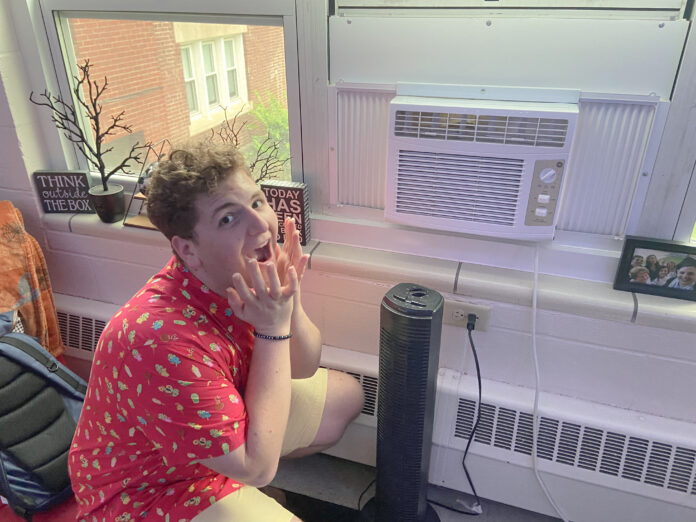
This year, there have been a number of students who have become ill, many of whom believe it is due to problems with residence halls, The Village and MILE houses. Those students complain of difficulty breathing as well as other allergy symptoms such as congestion, sneezing and coughing. With the rise of COVID-19 cases on campus, Health Services has been recommending that students who have experienced those symptoms get tested. However, those who have tested themselves have reported negative tests wonder what it is that is making them sick, and suspect issues with residence halls.
One student who chose to remain anonymous detailed problems with Martin Luther Hall (ML), saying that, “You already know that the building is in bad shape when you approach the outside of it and already smell an odor. When you walk into the building, you get hit with a new smell. Then, when you walk into the dorm rooms, you get hit with a totally different smell. But there’s a difference between the building smelling and the smells causing health concerns too.”
“I know from personal experience, and other people too, that it is causing coughing and sinus congestion, all signs of some irritation that the body is trying to get rid of.”
Anonymous student
Students have also been complaining about problems with window air conditioning (AC) units in ML. A student commented saying, “I have heard from many students that coming onto campus [that] their AC was dirty, even though when I spoke with Plant Operations they claimed that the ACs are cleaned every summer. When I had the AC on, I felt my symptoms worsening.”
Giovanna Evans ‘25 echoed those sentiments saying, “I have severe allergies and asthma. And while living in ML, my symptoms worsened rapidly. I constantly felt suffocated in the hallways and bathrooms.” Evans was able to move to East Hall, and saw an improvement saying, “I already feel a lot better, and I am glad I got to change buildings.”
According to an email from Housing and Residence Life (HRL) they have “received 13 reports which were investigated and determined to be unfounded. Despite this, in some cases, students were given the opportunity to change their housing assignment due to other concerns and/or to maximize their overall comfort in the residence halls. Each report is investigated thoroughly.”
While HRL claims that, “In almost all cases when a student reports mold, it is actually mildew, dirt or dust that has built up during the time students are living in a room,” the Environmental Protection Agency defines mildew as “certain kinds of mold or fungus.”
However, the 13 reports of mildew this year are nothing new. Housing said that, “Each year, we receive an average of 100 reports from students referencing a possibility of mold or mildew and we address each of those individually. Plant Operations has checked and the number to date for this year is on trend with the number of reports we received last academic year at this time.”
While most of the reports are unfounded, HRL still prioritizes the health of students by conducting a precautionary antimicrobial treatment where a report has been made. In addition, HRL conducts air quality tests periodically, and “recent results showed that all indoor bioaerosol samples were within normal limits based on both indoor air quality consensus agency guidelines and as compared to the outdoor sample.”
“The total spore counts in each indoor sampling location were low.”
Housing and Residence Life
Housing instructs students to make a report immediately if there are visible signs of mold or mildew. That report should include a detailed description including a picture. Students who are experiencing health problems are recommended to book an appointment with Health Services or their primary care physician.
While students might feel apprehensive about new cold and allergy symptoms since moving on campus, there are possible explanations for their sickness beyond mildew and mold growth in the residence halls. HRL says that, “In general, students living in congregant residential settings often get sick more frequently than they did in their home environment. In addition, sometimes in moving to the Valley, students don’t realize that there is a higher pollen count which often leads to new allergies or worsened allergy symptoms for some students. Ultimately, students often immediately look for external factors that could be contributing to their sickness, however those allergy and viral illnesses are most often associated with being busy college students in a highly populated living space.”
Matthew '24 is a philosophy and political thought major on the pre-law track.





















